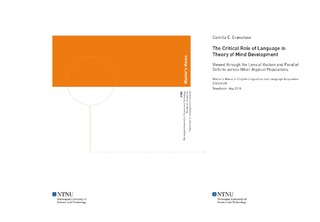| dc.description.abstract | Theory of mind (ToM) is a vitally important area for study not only within psycholinguistics but also across neuroscience and other diverse fields, because of its implications for the study of social cognition, and the diagnosis and treatment of developmental and clinical disorders. While this theoretical construct has existed within the literature for some time, a definitive explanation for its emergence, development, and acquisition has yet to be reached. This thesis conducts a qualitative, critical review of the theoretical and research literature with the aim of establishing the role of language as a critical facilitator in the development of a ToM. The review begins with an analysis of the theoretical and historical background of ToM, examining the various accounts that have been proposed to explain it, including executive function (EF). It then turns to a contemplation of the developmental perspective on ToM, and its investigation within the research literature. Building upon and contrasting with the findings of the first main chapter (§2), the second (§3) presents and evaluates various language accounts of ToM, with reference to the evidence from language-impaired populations, concluding that language acquisition is necessary on a number of levels for ToM development. The final main chapter (§4) investigates this relationship in the context of autism, a developmental disorder where deficits in both ToM and language ability have been found, inferring that these are causally related. The thesis concludes by arguing that the relationships between ToM and language, and ToM and EF, are more dynamic than have previously been considered. Finally, it proposes that these relationships can be better understood within the framework of a tripartite model, representing the co-developmental, multidirectional interactions between each component. These findings are significant for future work not only on ToM and social cognition, but also with atypically developing and clinical populations. | nb_NO |
